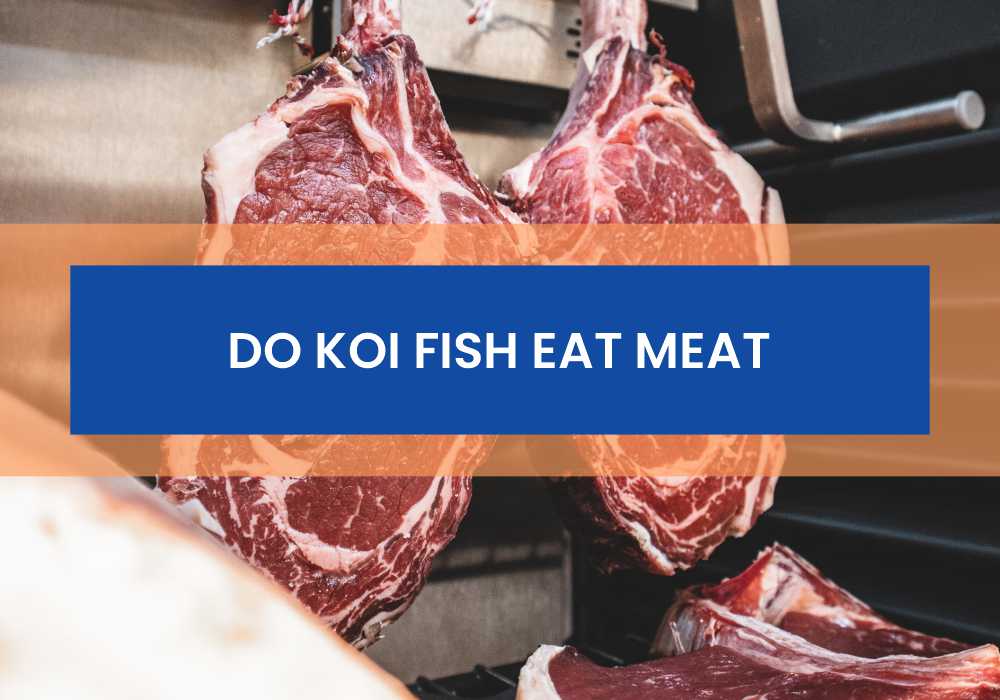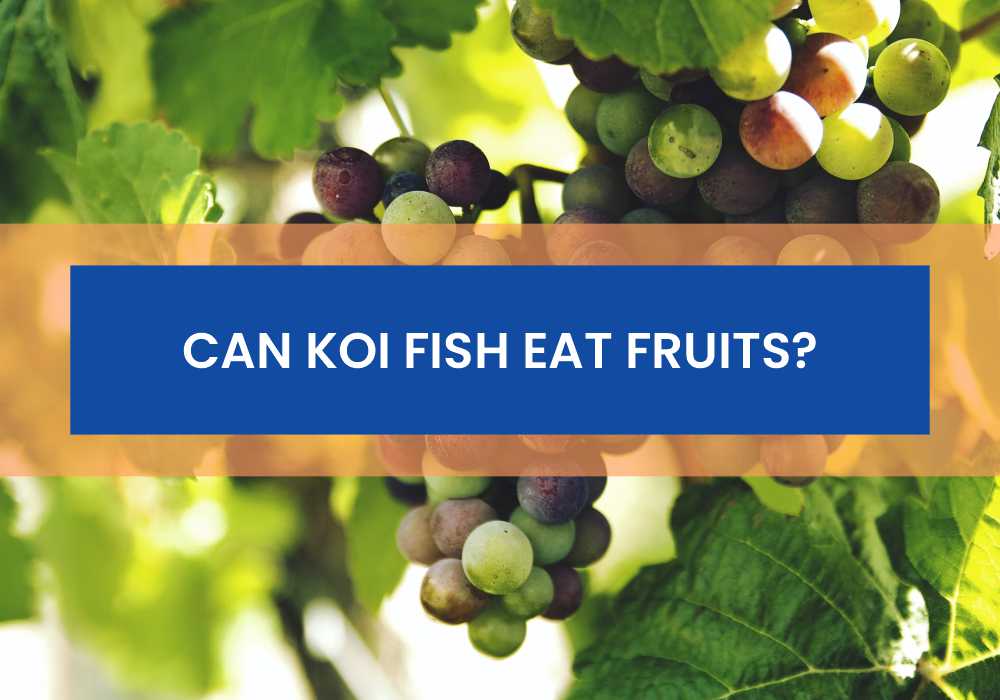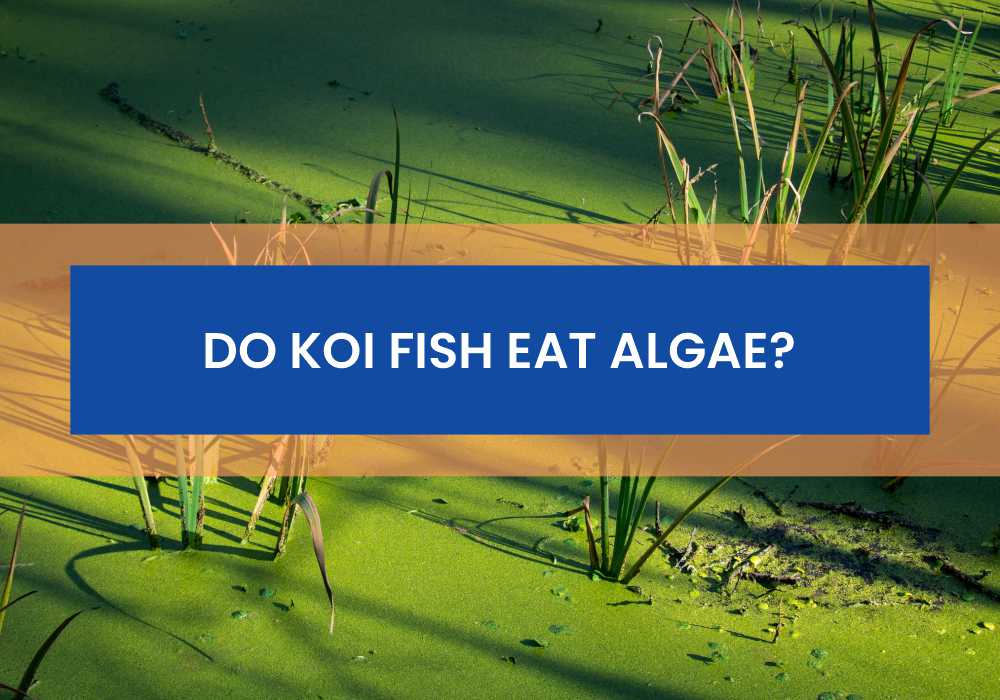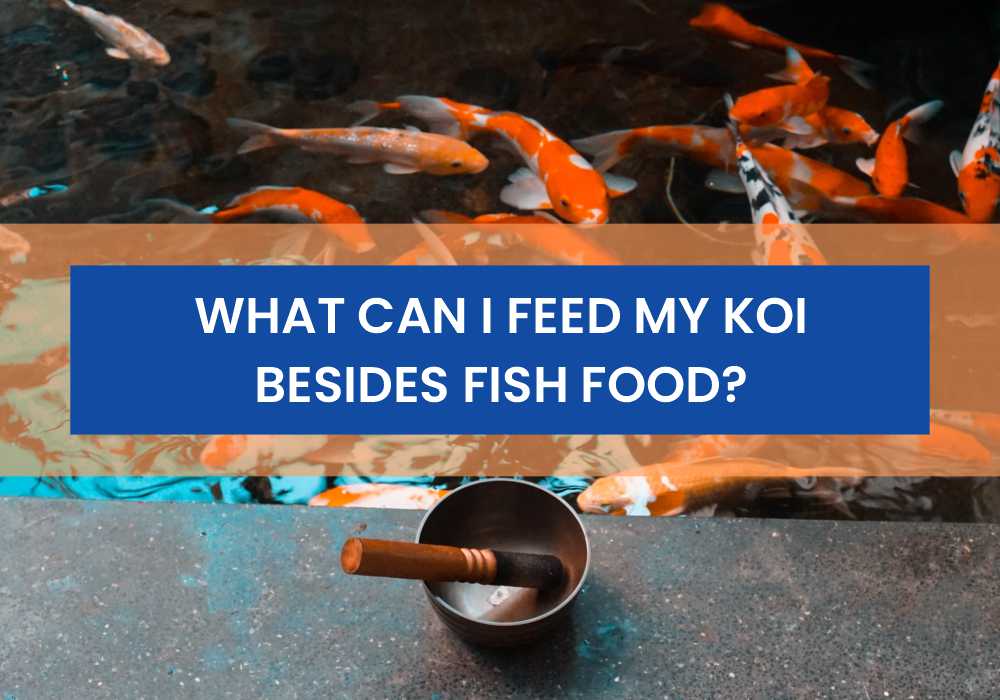As an Affiliate, We may earn a commission that doesn't cost you extra from qualifying purchases using links in this post. It helps keeps this blog running.
Koi are a popular fish that can be found in many ponds and lakes. While they are commonly thought to be vegetarians, which is a misconception, they are some evidence that koi may occasionally eat meat. In this blog post, we’ll take a look at what science has to say about koi diets, and whether or not they are true herbivores.
But before we proceed, let’s first go into the backstory of what Koi eat in the wild.
What Do Koi Fish Eat In The Wild
While Koi fishes are often thought of as ornamental fish, they actually have a life in the wild. In the wild, Koi fish largely consume plant matter as well as small insects, crustaceans, and other aquatic creatures. Their diet consists mostly of algae and aquatic plants but they are also opportunistic feeders who can also eat bugs, mosquitos, and other small insects that fall into the water. While you can find Koi nibbling on just about anything in their natural habitat, it’s important to note that they are primarily herbivores.
While in captivity like in ponds or aquariums, Koi are often fed pellets or flakes designed specifically for them. This diet is higher in protein than what they would eat in the wild and helps to ensure that they grow to be large and healthy.
Do Koi Fish Eat Meat?
Yes, Koi can eat and digest meat. Although it is a common misconception that koi fish are purely herbivorous, in fact, they are opportunistic omnivores. This means that they will consume both plant and animal matter, depending on what is available.
As any pet owner knows, it is important to choose the right food for your animal companions. carnivores require a diet that is rich in protein, while herbivores need a diet that is high in fiber. So, what do koi fish eat? Koi are technically omnivores, which means that they are able to digest both plant and animal material. In the wild, koi will feed on a variety of aquatic plants like algae and seaweed, as well as small insects, crustaceans, and other invertebrates.
While koi can technically survive on a vegetarian diet, most experts agree that they will do best with a diet that includes some meat. This is because koi require certain nutrients, like amino acids and fatty acids, which are found in animal protein. Koi also have a high demand for energy, and animal protein is a more efficient source of energy than plant protein.
When choosing food for your koi, look for pellets or flakes that contain either fish or meat meal or other sources of animal protein. You can also supplement their diet with live foods like earthworms, brine shrimp, or bloodworms. It’s important to avoid overfeeding your koi, as this can lead to obesity and other health problems.
Now that we know a Koi can eat Meat, but
Can Koi Fish Eat Raw Meat?
Koi fish will consume larger prey animals if they are available, and this includes raw meat. So, can koi fish eat raw meat? The answer is yes, but it is not recommended as a regular part of their diet. Raw meat is harder to digest than other food items, and it can also contain harmful bacteria.
While koi are not typically considered to be predatory fish, they are opportunistic feeders that will consume almost anything that fits into their mouths. This includes small insects, crustaceans, and even other fish. In terms of diet, koi are not particularly picky eaters, and they will readily accept most types of food. This includes pellets, flakes, live food, and even raw meat.
How Do You Know If A Meat Is Safe To Eat For A Koi Fish?
Knowing if a meat is safe for koi fish can be tricky. The best way to know for sure is to ask your veterinarian. Other than normal koi fish food, some meats like chicken, are generally safe to eat for koi fish. However, other meats, like beef, can be riskier. If not properly cooked, beef can contain bacteria that can make koi fish sick. If you’re not sure whether or not a particular type of meat is safe for your koi fish, it’s best to err on the side of caution and avoid feeding it to them.
In the absence of a vet, there are a few things you can look for when trying to determine if meat is safe to feed your koi fish and some of them are below:
- Expiration date: Most meats will have an expiration date stamped on them. If the meat is past its expiration date, it’s best to avoid feeding it to your koi fish.
- Smell: Another way to tell if a slice of meat is safe to feed your koi fish is by smell. Fresh meat shouldn’t have a strong smell. If the meat has a bad smell, it’s best to avoid feeding it to your koi fish.
- Color: Fresh meat should also be a certain color. If the meat is discolored, it’s best to avoid feeding it to your koi fish.
- Texture: The texture of the meat can also be a good indicator of whether or not it’s safe to feed your koi fish. If the meat is slimy or has a strange texture, it’s best to avoid feeding it to your koi fish.
- Finally, if the meat is freezer burned or has been thawed and refrozen, it is not safe to feed to your koi.
Steps On How To Feed Koi Fish Meat
In order to feed meat to koi fish, you will need:
- At least one piece of meat (thawed if frozen)
- A sharp knife or pair of scissors
- A cutting board (optional)
- A plate or bowl for the discarded meat
How To Feed Koi Fish Meat
- First, you will need to obtain some meat for your koi fish. You can purchase this from a grocery store or butcher, or catch it yourself if you live near water where koi reside. Make sure that the meat is thawed if it was frozen when you purchased it.
- Inspect the meat for any spoilage or signs of contamination. If there are any questionable areas, trim them away with a knife or scissors.
- Next, you will need to prepare the meat for feeding. Cut it into small pieces, bite-sized pieces using a sharp knife or pair of scissors. You can do this directly on the cutting board, or if you prefer, transfer the meat to a plate or bowl first.
- Once the meat is cut into small appropriately sized pieces, it is ready to be fed to your koi fish. You can simply drop the pieces into the water. Watch closely to make sure each fish is actually eating the meat, and not just nibbling at it.
- If after a few minutes you have leftover meat, remove it from the water so that it does not contaminate the pond or tank. You can either discard it or save it for another feeding.
With proper preparation, feeding meat to koi fish can be a simple and straightforward process. By following the steps outlined above, you can ensure that your fish are getting the nutrition they need to stay healthy and thrive.
Do Koi Have To Eat Meat To Survive?
Like all fish, Koi need to eat food that contains nutrients in order to survive. However, unlike many other types of fish, koi are not obligate carnivores, which means that they do not require animal protein to survive. Instead, koi can get the majority of their nutrients from plant-based sources. This makes them relatively easy to care for, as they can be fed a variety of different foods, including pellets, flakes, and vegetables. While koi do need some animal protein in their diet, they can get by on a diet that is mostly plant-based. As a result, koi can be a great choice for aquarists who are looking for a low-maintenance pet.
How Can You Tell If Your Koi Isn’t Getting Enough Protein?
If you’ve ever kept fish as pets, you know that they need a well-balanced diet in order to stay healthy. This is especially true for koi, which are a type of carp. In the wild, koi feed on a variety of plant and animal life, including small insects, crustaceans, and amphibians. In captivity like in ponds or aquariums, their diet is typically composed of pellets or flakes that contain all the necessary nutrients. However, protein is an essential part of a koi’s diet, and if they’re not getting enough of it, they may start to show some telltale signs.
One common sign that your koi aren’t getting enough protein is if they stop growing. Koi are known for their rapid growth rates, and if they suddenly stop growing, it could be a sign that they’re not getting enough protein.
Another common sign of protein deficiency in Koi is lethargy. If your koi seem sluggish and uninterested in their food, it could be an indication that they need more protein in their diet.
If you suspect that your koi aren’t getting enough protein, speak to your veterinarian or a qualified aquarist. They will be able to recommend a food that is high in animal protein, as well as other essential nutrients that will quickly help the fish recover.
What Are The Benefits Of Feeding Koi Fish Meat?
There are many benefits of feeding koi fish meat as a diet and some of them are listed below:
- It is a good source of protein which is an essential macronutrient for koi fish and their growth.
- It can help improve the color of koi fish
- Meat is a good source of many essential nutrients such as vitamins and minerals such as Vitamin B and Iron, which are necessary for the health of koi fish.
- A meat diet can help to increase the size of koi fish.
- It can help improve the overall health of koi fish
- Feeding koi fish a meat diet can help to keep them active and playful, as they will have plenty of energy to swim around and explore their environment.
What Are The Risks Of Feeding Koi Fish Meat?
There can also be a lot of risk feeding koi fish meat as a diet and some of them are listed below:
- Feeding koi fish a meat can increases the risk of them contracting diseases such as bacterial infections, parasites, and viral diseases due to contaminated meat.
- Feeding koi fish a meat can increase their chances of becoming bloated and suffer from stomach upsets. This can be extremely uncomfortable for the fish and may even lead to death.
- Koi could suffer from digestive issues if they eat too much meat or if the meat is not properly prepared.
- Feeding koi fish a meat diet increases the risk of cannibalism amongst the fish. This can lead to serious injury or even death.
- Feeding koi fish a meat can attract pests and predators to your pond which can be dangerous for the fish.
- Another risk is that koi may become overweight or obese if they eat too much meat, as meat is high in calories.
- Feeding koi meat can also increase the risk of ammonia and nitrite poisoning, as the decomposing meat can release these harmful chemicals into the water.
Do Koi Fish Eat Crayfish, Shrimps, and Prawns?
Yes, Koi will eat Crayfish, Shrimp, and even prawns. While koi are technically omnivores, they have a preference for plant-based food items. This means that they will consume meat if it is available, but it is not a necessary part of their diet. In terms of specific meats, koi are known to eat crayfish, shrimps, prawns, and other small seafood items.
Crayfish are a type of freshwater crustacean that is related to lobsters and shrimp. They are a popular food source in many parts of the world, and their delicate flavor has made them a favorite among chefs and home cooks alike.
While koi can safely eat crayfish and other small seafood animals, it is important to note that these crustaceans can be a potential source of disease. This is because they often live in waters that are polluted with heavy metals and other toxins. As a result, it is important to only feed your koi crayfish that have been raised in clean, freshwater environments.
Do Koi Eat Insects?
Koi are opportunistic feeders that will consume almost anything that fits into their mouths. This includes small insects, crustaceans, and even other fish. In terms of specific insects, koi are known to eat mosquito larvae, dragonfly larvae, and other small aquatic insects. While koi don’t necessarily need to eat meat to survive, they certainly enjoy it and will often devour anything that they can catch.
Can Koi Fish Eat Beef and Pork?
While koi are not strict vegetarians, they do get the majority of their nutrients from plant-based sources. That being said, koi will occasionally eat meat if it is available. In terms of specific meats, koi have been known to eat beef, pork, and even prawns. It is important to note that koi should not be fed a diet that is exclusively meat-based as this can lead to health problems.
Do Koi Eat Other Fish?
Koi are not typically predators and will only eat other fish if they are small enough to fit into their mouths. In most cases, koi will only consume fish that are already dead. However, there have been instances where koi have attacked and eaten smaller fish. If you have koi and other fish in the same pond, it is important to monitor them closely to make sure that the koi are not attacking the other fish.
What Are Some Other Good, Meat-Free Food Options For Koi fish?
While koi do need some animal protein in their diet, they can get by on a diet that is mostly plant-based. As a result, there are a number of different food options that are suitable for koi fish.
- Pellets: One popular option is pellets. Pellets are a type of dry food that is made from compressed plants and other ingredients. They are easy to digest and provide all the essential nutrients that koi need.
- Flakes: Another good option for koi is flakes. Flakes are similar to pellets, but they are much smaller and easier to eat. They are also a great source of nutrients, making them an ideal choice for koi fish.
- Vegetables: Vegetables are another good option for koi fish. Many vegetables, such as zucchini, lettuce, carrot, cucumber, and squash, are packed with nutrients that are essential for koi health. In addition, vegetables are a good source of fiber, which can help promote healthy digestion.
When it comes to feeding koi fish, there are a number of different options available. While koi do need some animal protein in their diet, they can get by on a diet that is mostly plant-based. As a result, pellets, flakes, and vegetables are all good options for koi fish. If you suspect that your koi aren’t getting enough protein, speak to your veterinarian or a qualified aquarist. They will be able to recommend a food that is high in animal protein, as well as other essential nutrients that will quickly help the fish recover.
The Benefits of Feeding Your Koi Fish A Varied Diet
As with any living creature, it is important to provide your koi fish with a varied and nutritious diet different from normal koi food. A healthy diet will ensure that your koi fish stay active and vibrant, and can help to prevent many common health problems. In the wild, koi fish eat a variety of plant and animal matter, so it is important to try to replicate this diet as closely as possible when keeping koi fish as pets.
One important thing to remember is that koi fish are omnivorous, which means that they need both plant and animal matter in their diet. While it is possible to keep koi on a purely vegetarian diet, this is not ideal and can lead to health problems further down the line. A diet that includes both plant and animal matter will provide your koi with all the nutrients they need to stay healthy and thrive.
Below are some of the benefits of feeding your koi fish varied food:
- A varied diet helps to ensure that koi fish get all the nutrients they need to stay healthy.
- A diet that includes both plant and animal matter can help to prevent health problems further down the line.
- A varied diet helps koi fish stay active and vibrant.
- A varied diet can help to replicate the diet koi fish would have in the wild.
- A diet that includes both plant and animal matter can help to support the growth of koi fish.
- A varied diet can help to ensure that koi fish have a long and healthy life.

I’m Akin Bouchard. Even though I now own several different fish species, I first became a koi pond owner because I loved these creatures and wanted to turn my passion into something more serious. I take pride in my collection of koi fish and love sharing my knowledge with others interested in these beautiful creatures.
A Comprehensive Guide to Training Your Fish to Perform Amazing Tricks Feats




